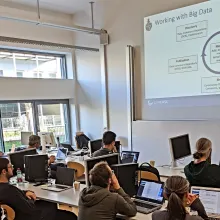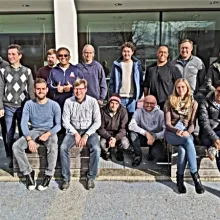New CyVerse Node Brings Easier Collaboration to Austrian Scientists
A CyVerse node has been created serving three research institutions in Austria, providing localized data management and tailored research solutions for Austrian scientists using CyVerse infrastructure. The effort is the second installation of CyVerse syst

A CyVerse node has been created serving three research institutions in Austria, with the primary system at Graz University of Technology. Photo by Tyson Swetnam/CyVerse.
Science seldom adheres to the boundaries imposed by country lines, as researchers frequently forge international collaborations to tackle shared scientific questions and challenges.
In recognition of this, CyVerse, the National Science Foundation's

Graz, Austria
(Photo by Tyson Swetnam/CyVerse)
premier data management platform, has expanded its infrastructure deployments outside of the U.S., bringing higher compute performance to its European colleagues.
"CyVerse has always adhered to open science and open source principles," said Nirav Merchant, a CyVerse co-principal investigator and Director of Data7, the University of Arizona's Data Science Institute. "The installation of our infrastructure framework overseas is yet another example of how we empower global research collaborations and scientific achievements."
"When we were approached by colleagues from Austria on utilizing CyVerse, a lot of their questions were around how CyVerse could help with their data management," Merchant continued. "As our colleagues realized what could be done with the CyVerse platform – especially in terms of streamlining analytics and reproducibility, which are absolutely essential for today's research requirements in every discipline – they quickly were able to adopt those capabilities and then weave that into what they wanted to do with the data."
The deployment of a separate CyVerse node in Austria enables researchers to manage their resources locally for faster compute, tailor unique solutions to their own research questions, and exchange ideas for integrated tools across systems.
The CyVerse Austria deployment will consist of a separate, duplicate infrastructure for Austrian scientists, functionally identical to the original U.S. system. The new platform will be hosted between three Austrian institutions with the primary system at the Graz University of Technology (TU Graz).

Training Austrian researchers
on CyVerse systems. (Photo by
Tyson Swetnam/CyVerse)
One challenge posed by the project has been adapting CyVerse to satisfy European privacy standards. "The versatility of the CyVerse platform enabled us to meet the requirements of the General Data Protection Regulations and better serve our European colleagues," said Edwin Skidmore, director of infrastructure at CyVerse.
"CyVerse has played a key role to ensure the success of the deployment in Graz Universities," said David Garcia de Marina, digital life science business area manager and big data consultant for the Know Center at TU Graz. "From the beginning, they actively listened to the particularities of our initiative. Without their support the deployment would not have been possible within the planned time-frame and quality."
To help bring the CyVerse Austria node online, CyVerse educators traveled to Graz, Austria to provide an initial training workshop in late 2019. Attendees included professors, staff scientists, and graduate students, all of whom used their own data as they learned to use CyVerse systems, efficiently implementing the platform in their research.
"For this training, CyVerse Austria brought in groups ranging from researchers in the

CyVerse educators and
participants of the CyVerse
Austria workshop in 2019.
(Photo courtesy of TU Graz.)
medical university to technical infrastructure staff, all working together," Merchant observed. "That is the strongest part of CyVerse: all of these groups can coexist on the same infrastructure and receive support at all stages of their computational competency, from beginner to advanced users."
Global deployments of CyVerse infrastructure will give researchers the ability to manage data anywhere and anytime they need, added CyVerse principal investigator Parker Antin. "Collaborations that we've established, such as CyVerse Austria, illustrate the community that we're building that is helping us to maximize our capacity to transform science through data-driven discovery."
"With this first part completed we have ensured the availability of a powerful data management platform in the ecosystem of Graz Universities," noted Garcia de Marina, "but more importantly, we are now part of the CyVerse philosophy and community. We are already working toward future phases where CyVerse will be extensively used in the majority of Austrian Universities."
"My heartiest congratulations to the dedicated team at CyVerse Austria," added Merchant. "I am delighted that they share the vision of CyVerse as an innovation platform that connects data, connects computation, and more importantly, connects people. We look forward to many years of fruitful collaborations, which are essential today in the field of data science."

